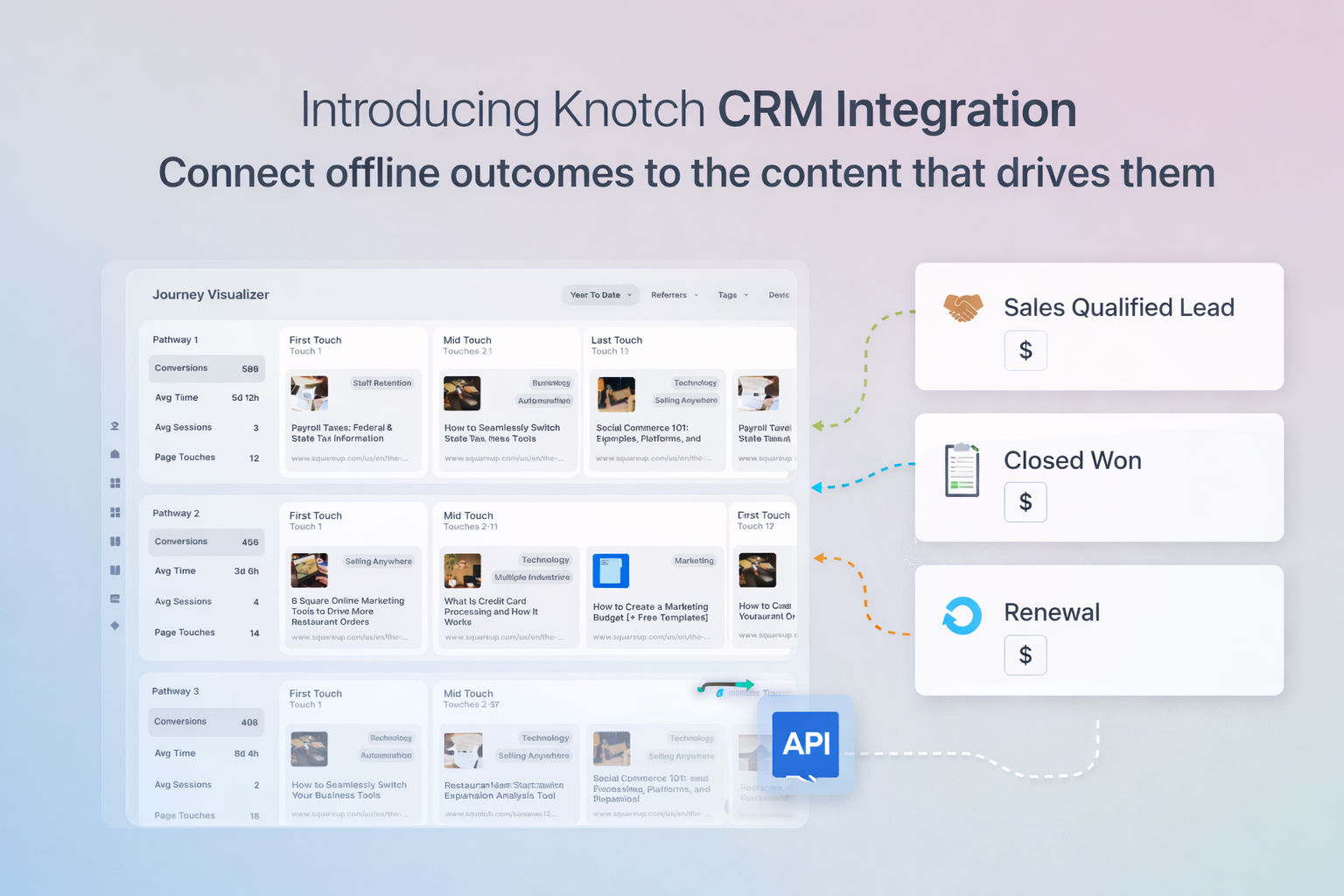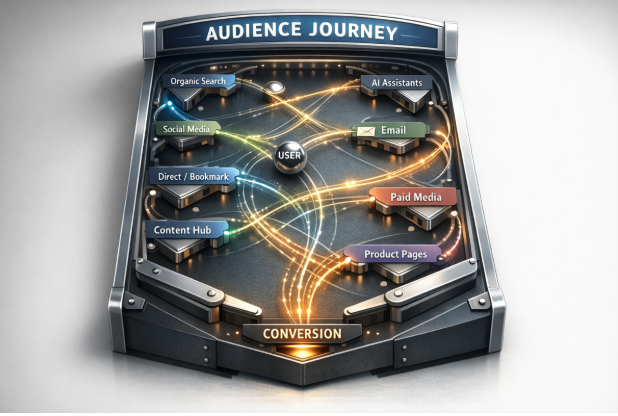
What do tomorrow’s CMOs think about the future of websites? These 5 insights may surprise you

The very first website was published on August 6, 1991 by Tim Berners-Lee, laying the foundation for today’s sprawling online ecosystem. Yet nearly 35 years later, websites still play an outsized role in marketing. Website landing pages remain one of the top tools for lead generation – second only to email – with 44% of marketers in a survey citing them as their most effective channel.
But websites are at a turning point. As AI-optimized search and discovery recalibrate the customer journey, what exactly becomes of the traditional website? That was the backdrop behind Knotch’s recent NextGen CMO event in New York, hosted for its community of rising marketing leaders. Are websites dying, or just evolving?
Inspired by the off-the-record discussion that day, we’ve compiled five surprising things that tomorrow’s CMOs think about the future of websites. Spoiler alert: They’re not going away.
1. AI is a "liberation” for websites.
Yes, “liberation” is the word that was used. It’s not an exaggeration. For decades, digital teams have been trapped in the grind of content production – drafting endless content, tweaking for keywords, and sculpting every sentence to appease search engine algorithms. The result has often been content that checks SEO boxes but reads flat and uninspired to actual humans. The rise of AI changes this equation entirely. By automating much of the repetitive, mechanical work of content creation and optimization, AI frees marketers and creators to focus on the part that really matters: ideas, stories, and experiences that resonate.
At the same time, the shift toward discovery through large language models (LLMs) means content no longer has to be written with SEO tunnel vision. Instead of forcing text into rigid keyword molds, brands can produce richer, more engaging material designed for human readers as well as coherent, structured content that answers specific questions in order to optimize for LLMs. LLM optimization has the opportunity to fix the dissonances that SEO optimization created.
2. The vanguard is anyone's game.
One attendee at the NextGen CMO event asked the question: Which companies are on the bleeding edge of innovation in websites for the AI age? After all, when we think back to prior revolutions in digital marketing, it’s easy to recall the pioneers. Nike and PepsiCo made waves in social media when many companies still thought it was a fad. Mondelez and GE were among the first to treat content marketing as a true brand strategy rather than a side experiment.
But when it comes to reimagining websites for the age of AI, there’s no obvious list of boldfaced global brands leading the charge. Part of the hesitation may be risk: AI adoption is still in its experimental phase, and the stakes for brand credibility are high. As one person at the NextGen CMO event said, “The bigger you are, the more difficult it is.” Sure enough, new numbers from the Census Bureau have found that AI adoption on behalf of companies with 250 or more employees has actually declined recently, suggesting that integrating agentic systems and processes has been tougher than expected.
Interestingly, research from Dexian suggests that it may not be the biggest global players but rather mid-market companies who are better positioned to move first. With fewer bureaucratic layers and greater organizational agility, these firms can test and iterate AI-driven website reinventions faster than the Fortune 100 behemoths, who tend to move more cautiously
3. Few marketers are genuinely bullish on websites -- but even fewer think they're going away.
When one of Knotch’s executives asked the room of future CMOs if they were bullish on the future of websites, only a handful of hands went up. But when pressed on whether websites were disappearing altogether, almost no one agreed. That ambivalence says a lot about where websites stand today: they remain central to brand marketing, but they carry plenty of baggage.
Our take here is that marketers are frustrated with the cost and complexity of maintaining sites, the friction between optimizing for SEO versus serving human audiences, and the challenge of keeping content fresh across sprawling digital ecosystems. And yet, for all their flaws, websites remain one of the few brand-controlled spaces online. They’re destinations where marketers can shape experiences, own data, and drive conversion in ways that social platforms or third-party intermediaries can’t match. The consensus? Websites may not inspire unqualified enthusiasm, but they’re far from obsolete.
4. Control remains a wild card.
Let’s get back to that key word: Control. Per the above, websites have long been the most easily controlled digital marketing channel for brands. But as websites evolve for the AI era, marketers are already uneasy about how their brands are represented in environments they don’t fully govern.
Whether it’s how search engines surface content, how ads are placed programmatically (and against what content), or how a brand is presented in an influencer’s YouTube video, brand safety has always been a concern. It becomes even more critical in an AI-driven landscape where algorithms can remix or reframe content in unpredictable ways. The stakes climb even higher for companies whose business models depend heavily on advertising revenue, since any misstep in context or placement can quickly erode trust (and drive advertisers away).
Until marketers feel confident that they can steer and safeguard how their brand appears across these new AI-powered channels, control will remain the defining wild card in shaping websites’ future.
5. Marketers still have a lot of questions and aren't sure where the answers are.
If one theme dominated the room, it was curiosity mixed with uncertainty: Marketers are eager to understand how AI will reshape not just their websites but their organizations. Will smarter tools finally help break down the silos and unwieldy org charts that slow content production today? Which platforms and technologies will actually matter, and which are just noise? And how can CMOs prepare themselves and their teams for a future where AI is embedded in every workflow?
For now, there are more questions than answers. What’s clear, though, is that marketers are hungry for guidance. The NextGen CMO event concluded with an eager interest in sharing resources, whether it was recommendations for newsletters, podcasts, and peer communities that can help them make sense of this fast-changing landscape and get AI-ready in their day-to-day roles.
Published September 17, 2025
Become a thought leader
Become a thought leader
Trusted by the largest (and now smartest) brands in the world.
“Before Knotch we did not understand what content was driving business results. Now we understand which content moves the needle. Knotch’s cohesive reporting and insights paint a real picture of what’s happening on our website instead of the patchwork quilt that comes from a Google Analytics approach. With Knotch we have been able to re-prioritize ad spend, route better leads to our SDR team, and inform our content development initiatives.”

"The Knotch platform ensures that we deliver high-performing content tailored to young home shoppers, enhancing their experience and driving better business outcomes.”

"Our partnership with Knotch has been highly successful, empowering us to leverage data-driven insights and refine our content strategy.”


.png)






